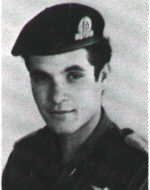Perlmutter, Arie (“Pepi”)
Son of Joseph and Chana, of Polish origin and survivors, who knew a great deal of suffering in their lives. Arie was born on May 21, 1949 in Nahariya. He grew up and studied at the Hof Hasharon Institute in Kibbutz Yakum. As a child he traveled a lot with his father. On one of the trips, he stopped for a moment, when a light came on in his eyes: “Dad, look at our fields.” In his youth he took part in extensive activities, which included, inter alia, training of children and participation in various sports. He liked to read a lot, especially poetry. He also reached out to write. His literary legacy includes many songs, songs and prose. He liked music, which spoke to him with great sensitivity. Played the accordion and discovered once that it enabled him to pry on the piano and express his special love for Chopin. . . He was 17 years old when he was about to receive the older sergeant of Hashomer Hatzair with his friends. The acceptance of the symbol seemed to him only a formal matter, so he objected with the minority in his group to receive the letter. During this period he was influenced by the messianic movement, Martin Buber, and became interested in philosophy. He was drafted into the IDF in early January 1968. His close friends, who recognized him as an avowed individualist, predicted that he would find it difficult to compromise with the military routine, but this was only during his basic training. At the Independence Day party, the organizers unexpectedly asked him to tell about his parachuting in the army, and he stood in a light blue shirt and white trousers, in front of all the members of the kibbutz, The only one who was still in regular service was given command, and won by cadets from among his students When Aryeh was asked about his future, Aryeh wondered whether to return home or to accept the order of the day, and to join the regular army because the army needed him.This was a difficult period for his parents as well, because they wanted to return home. “On the 17th of Sivan 5739 (10.6.1971), he fell in the line of duty and was brought to eternal rest on Kibbutz Yakum. One of his teammates found among his drawings: “I have a secret fear that I will die before I can speak,” as if he felt the future would happen to him. His friend in the officer’s course wrote to his family: “To find one so naive as a Aryeh in the officer’s course was a pleasant surprise, and on those long Sabbaths when we did not go home, we would go to the empty hall where only the piano stood, Or we would spend some time talking about poetry and philosophy, subjects that would suddenly light up in our officers’ classes as well, so we would exchange opinions on a piece of paper passed from hand to hand: Aryeh lived a life of poetry and at the first exit home I remember that he Covered the glass of the bus window with poetic words. ” About a year after his fall, a booklet was published in his memory bearing his name.
